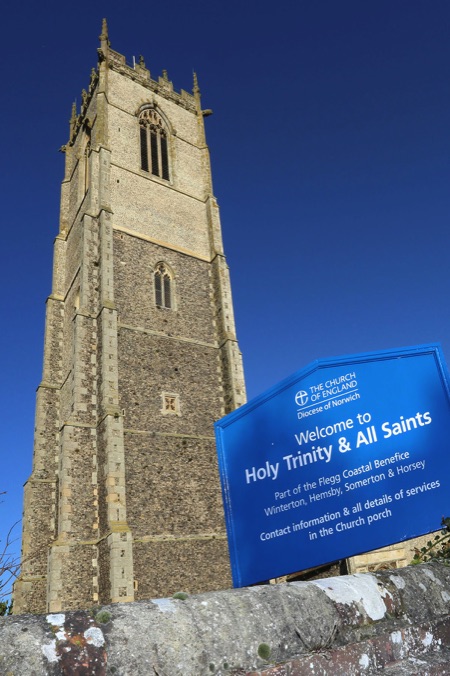
Rev Clarence Porter's grave, which is in line with the altar
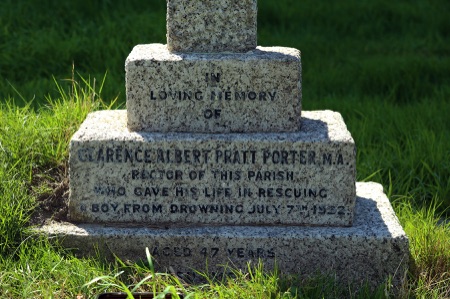
THE fishing heritage of Winterton is apparent as soon as you walk through the door of Holy Trinity and All Saints Church.
Nets from one of the last fishing boats that made a living from the beach hang from the walls and at the back of the church is Fisherman's Corner with a crucifix carved from ships' timbers.
The feature was the idea of one of current vicar Rev John Bloomfield’s predecessors, Rev Clarence Porter, who was rector between 1925 and 1932.
Holy Trinity and All Saints Church, WInterton-on-Sea
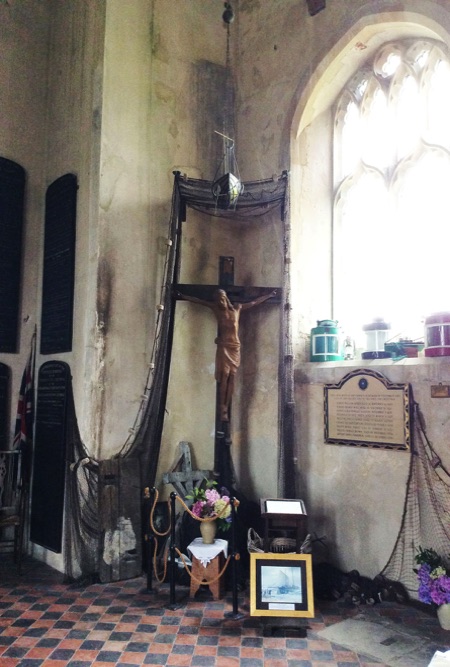
Fisherman's Corner
Rev Porter's life was cut short when he suffered a heart attack after rescuing a choirboy from the sea and among the tributes to local lifeboatmen, who carried out daring rescues, is a memorial to him. He is buried in the churchyard and flowers are still occasionally laid on his grave.
Joseph Hume of nearby Burnley Hall, a 19th Century MP who campaigned against anti-trade union laws and protested against flogging being used as a punishment in the army, is also remembered on the walls of the church along with another Hume whose generous legacy can be seen in the beautifully carved roof and rood screen.
One of the 14th and 15th Century church's big claims to fame is the impressive tower. At over 132 feet high it dominates the landscape and served as a lookout post during times of war. Some of the soldiers who spent cold and lonely nights up there left their marks etched into the lead roof.
It underwent a major restoration in 2014 and now, on Saturdays during the spring and summer, it is open to the public and offers stunning views over the surrounding countryside as well as out to sea. On a clear day those who make the climb can see as far as Happisburgh lighthouse to the north and Caister water tower in the south. (Please see our slideshow).
Times and the local population may have changed over the years, but the church is still an important part of the village.
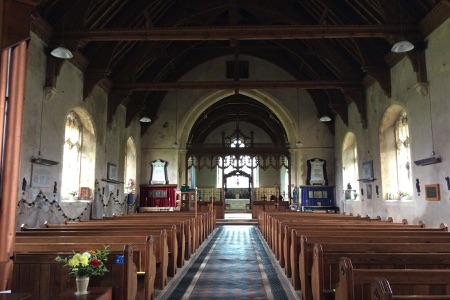
Inside Holy Trinity and All Saints Church
An aerial trip around the church
Church
A bird's eye view from the top of the tower - open to the public during spring & summer
Rev Clarence Porter's grave, which is in line with the altar
Service times and church events
Winterton Church is open daily for prayer.
No morning prayer on Fridays in February
Every Sunday
9am ... Sunday service. See below for details
Sunday February 5
10am ... A confirmation Service at Ormesby St Margaret, taken by Revd Dr Alan Winton, his final service as Bishop of Thetford. There is no service at Winterton.
Sunday February 12
9am ... 2nd Sunday before Lent. Communion Service.
Sunday February 19
9am ... Sunday before Lent. Morning Prayer.
Tuesday February 21
Noon - 1.30pm ... Shrove Tuesday pancakes are on sale at Church Room. £3 each with tea or coffee.
Wednesday February 22
7pm ... Ash Wednsday. Communion Service, including Imposition of Ashes.
Sunday February 26
9am ... Communion Service.
February 5, 12, 19 and 26
8pm Compline (online) - https://www.marthamchurches.org.uk
Friday March 3
Noon - 1.30pm ... Lenten lunch will be served at the Church Room. Soup and a roll, tea or coffee all for £5.
Donation boxes for the Flegg Area Foodbank can be found at the back of the church.
© All content copyright
winterton-on-sea
Picture by Cassie Tillett ©
To view more photos from the top of the tower please visit our slideshow page
For enquiries phone Revd Dr Steven Sivyer on: 01493 740823 or email: revdsteven@flegg.org.uk
or Sandra Laws on: 01493 393480 or email: salaws1951@aol.com
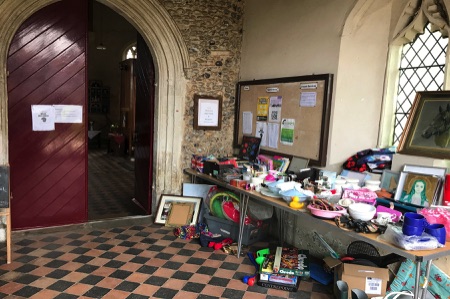
A message from Revd Dr Steven Sivyer
Books and bric-a-brac can be bought from the church porch at anytime
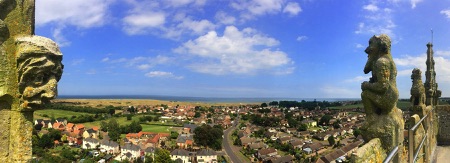
A FEW months ago, an Artificial Intelligence (AI)-generated picture won an art competition at the Colorado State Fair, and this follows on from AI successes against humans such as in chess. Then, in November, the program Cicero achieved human-level performance in the American board game Diplomacy and, in December, DeepNash mastered the board game Stratego. Maybe next Christmas Alexa will be able to send messages on our behalf instead of cards, deliver presents by drones, get our smart-oven to cook our dinner and take our Christmas services (the Church of England already has a ‘skill’ for them). Developments have happened throughout human history, but what is different about this is that we have set about building something that is designed to improve upon us.
A simple robot with four small mechanical legs was given the task of moving from one side of the room to the other, and was programmed using artificial neural networks and reinforcement learning so that the robot could teach itself. After a few days, the robot had learned how to take its first steps and had crossed the room. In getting the robot ready for a formal demonstration, the team examined how it was using its neural network to learn, and they discovered something unexpected: the robot had also taught itself how to read their facial expressions. Realising that observer feedback is data, AI had dedicated a neuron to processing this information. Humans instinctively recognise this choice: we have all stood around cheering on a toddler, because our feedback helps then learn how to walk.
22nd February is Ash Wednesday which begins the season of Lent. We use this time to re-examine who we are as humans. The bible tells us that we are made of the stuff of the earth (dust) and, when we die, we return to being dust (and millennia later science has backed this us). We are also made in God’s image and he himself became human (which we celebrated at Christmas). Therefore, whilst we are not at the stage of creating the Terminator, Pinocchio, Frankenstein’s Monster, or the Snowman, we are probably far enough down the line of creating AI that we ought to discern more about God’s blueprint for us and whether the ethics that we determine from God’s word should guide this rapidly-continuing advancement.
It is interesting that we call it artificial “intelligence”, as we are focusing on creating minds rather than whole bodies - our reasoning of ethics still protects us from full human cloning. When we look more closely at what we are developing, AI is only mimicking those parts of the human design that the programmers reckon are worthy, and the rest is treated as if its junk code, kept away from these machines so they are not polluted by it. So what are these parts of our humanity, God’s image in us that are being discarded? Intuition, conscience, emotions, uncertainty, meaning-making, story-telling, free will, mistakes, souls. Why did God give us these apparently flawed traits? We use our intuition and conscience to avoid danger and mistakes; our emotions promote healthy relationships and living as a community; uncertainty keeps us seeking out others for guidance and we hold our communities together through meaning-making and storytelling; free will gives us a feeling of purpose and enables us to have relationships with each other and God. Our so-called junk code promotes co-operation and the kind of reciprocal altruism which creates thriving communities. It is as if God knew what he was doing when he created us, even with these potential flaws.
Steven
Revd Dr Steven Sivyer. Team Rector (designate) of Flegg Parish Churches